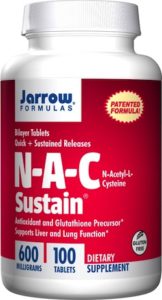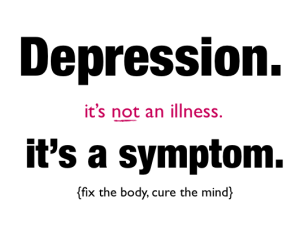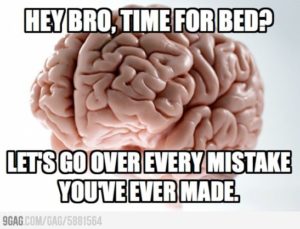Depression Isn’t The Problem, It’s The Symptom
And feel… Depressed…
Uh oh… Here it comes…
The big dark cloud of depression is starting to overwhelm you.
There’s nothing you can do now.
The depression has taken its hold.
Your mind begins to race. You worry obsessively.
You go down the dark spiral once again into a state of helplessness.
And think, “Damn you depression. You’ve got me again.”
Depression Is A Symptom Not A Disease
Thinking that depression is a disease is a myth that will bring you a lot of suffering. Believing that depression is a “thing” that you have will cause you to recover much slower.
How do I know this?
Because that is what I was told for years. I was also very, very depressed for 11 years. None of that helped me. In fact, it did a good job of keeping me depressed.
I was told by doctors that I simply needed to take an antidepressant. My therapist in college told me that I was going to have to take antidepressants for the rest of my life. I had a disease that for the rest of my life I could simply hope to manage this disease with medication.
What a shitty life I had ahead.
Yet, now I feel better than I have in my entire existence and I haven’t taken antidepressants in years. My post about how I got off of antidepressants is the most popular post on this webpage.
People are finally starting to realize that what they’ve been told all their lives about depression just might not be true. Because, well, they’re still depressed. If what they were told was true, it should have given them long-lasting results by now.
So then, what are you supposed to do if you are depressed now or are starting to get depressed?
Use Depression As A “Compass”
Here’s the good news: being depressed often has nothing to do with your inability to think positive 24/7 like a monk that’s been meditating for 10 years in a cave.
If you have been struggling with depression for a long time and have already tried all the cognitive behavioral experiments, quit beating yourself up.
Chris Kresser, who often talks about how depression is a symptom of deficiency and toxicity, reports that many of his patients that thought there was something wrong with them find amazing relief when they actually discover depression has physical roots. From his article, “Is Depression a Disease or a Symptom of Inflammation?” he writes:
Understanding the physical roots of depression can have a profound effect on people who are suffering from it. Although the stigma surrounding depression has decreased in recent years, many who are depressed still carry the burden of thinking that there’s something wrong with them, and the depression they experience is “their fault”. When my patients with depression learn that there’s an underlying physiological cause of their symptoms, they often feel a tremendous sense of relief and empowerment. What’s more, when we address this underlying cause, their mood improves dramatically and they quickly realize that the self-judgment and shame they felt about being depressed was misplaced and unwarranted.
I couldn’t have said it better myself.
If I ever start to feel depressed these days, I slow down and listen. Depression is telling me something, and if I relax and realize something else is causing the depression, I’m back to feeling good in no time.
What Do You Do If You Feel Depression Creeping Back In?
Another thing I absolutely hate about depression is how everyone used to tell me, “If you’ve had depression before, chances are, you will relapse.” Telling that to a depressed person is basically telling them not to try at all. Why try getting better if depression is just going to come back?
Guess what, I haven’t been depressed in years. There was one episode in Thailand when I got severe food poisoning and felt severely depressed when my gut was absolutely destroyed. Luckily, I knew what to do in case of a relapse and got myself back on track. It also didn’t just randomly “happen” out of nowhere, it was caused by a physical issue.
So much for the belief about relapsing every month into a depressive episode.
If you start to feel your mood go down or you are already depressed, I want you to try something new.
Listen to your depression and use it as a guide to finding your root causes.
Instead of freaking out and letting yourself become obsessed with the idea that you are starting down the downward spiral once again, just breathe and listen. Start asking yourself some questions.
- What is going on here? Anything significant happen recently?
- Have I been eating shitty foods? Have I been eating enough calories?
- Have I been sleeping properly?
- Have I gotten blood work done to rule out deficiencies or hormonal problems?
- Have I been eating anything like sugar, gluten, dairy, or anything else I’m sensitive to?
I’ve been amazed at how simple it has been sometimes to turn around and recover quickly. One time I started to feel down. I have an app on my phone called Sleep Cycle that records how I have been sleeping. I opened it up, and guess what. I had been getting around 5 hours of sleep for a week straight. No wonder my mood is low.
One time I wasn’t feeling too hot, then realized that I had been eating white flour tortillas from burritos and eating out almost everyday. I accepted my fate of not being able to eat burritos because of my sensitivity to wheat and gluten, cut them out again, and my mood came back.
Remember, depression is a symptom not a disease. Once you find the root cause of what is making you depressed and fix it (or fix them if you have several things going on), the depression will lift.
Common Conditions That Are Making You Depressed
Start to see your depression as a guidepost leading you to the causes, not the actual problem itself.
Take my story for example.
I was eating McDeath all the time, I had experienced some pretty severe trauma from watching my brother die a painful death as cancer ripped apart his insides, my family had split up, I had B Vitamin, Vitamin D, and magnesium deficiencies, was slightly allergic to gluten and dairy, and had adrenal fatigue.
After my brief experiment with antidepressants and mainly my experience with Celexa, I realized there was some major changes to make in my diet. I ate amazingly healthy, took basic supplements and vitamins for depression, raised my Vitamin D levels into the optimal range, got my stress in check, mastered getting a good night’s rest, and started to feel better.
Holy sh*t I thought, I knew I felt bad, but I didn’t know I felt that bad.
Later on, testing revealed I had adrenal fatigue. I fixed that, and my energy levels started to skyrocket.
What would have happened if I would have walked into a doctor’s office and instead of quickly prescribing me a drug, he checked and saw that my blood test showed I had low Vitamin D and magnesium? What if that doctor checked my hormonal panel and saw high estrogen, low DHEA, and interesting cortisol patterns and realized my adrenals were worn out as all hell from the stress I endured?
What if that doctor would have asked me what my diet was, and realized I wasn’t eating healthy at all? What if that doctor would have realized my sleep quality sucked?
You can get depressed from thyroid problems, gut issues, IBS, parasites, candida yeast, medications, adrenal fatigue, low testosterone, improper sleep, vitamin and/or mineral deficiencies, lack of exercise, food allergies, and a whole range of other things I can’t list off the top of my head.
If all of those things can cause depression, why are we told to just accept that we are depressed as if it is some life-sentence? Why aren’t these possibilities explored, especially when something as simple as a magnesium deficiency is so easy to correct?
Other Stories
With each person that I talk to, I always try to figure out basic changes and quickly try to target root causes for why their mood is the way that it is.
One person that was emailing me, I simply suggested that he try taking a high quality B12 supplement. His symptoms of being dizzy and tired all the time sounded eerily similar to just a basic B vitamin deficiency. He reported that in only a day or two, the B12 supplement was fixing his dizziness and fatigue and he was able to work through the day much easier.
Another person I just finished working with had a few more things going on. Again, it wasn’t depression that was her enemy, it was all the conditions going on that was producing the symptom of depression that we had to target.
Medications never worked for her long-term. After digging deeper, she found out her cortisol was through the roof and her vitamin d and iron levels were low. Her past diet did not contain enough fat and protein.
After fixing her out of whack stress hormones and deficiencies, she feels great now simply with stress management, good diet, exercise, and some supplements when needed.
If you haven’t read Maria’s amazing story, you deserve to. Click here to read how she beat depression and believes she has the long-term cure to her mood problems.
Using N-A-C To Fix Depression
 Another interesting example is Mike. His maternal side has a long history of mental illness and he struggled with anxiety and depression. After learning that N-acetyl cysteine was used for depressive symptoms in a double-blind randomized placebo-controlled trial to beat depressive symptoms in bipolar disorder (PubMed) he starting taking a simple dose of Jarrow Formulas N-A-C Sustain to raise his glutathione levels.
Another interesting example is Mike. His maternal side has a long history of mental illness and he struggled with anxiety and depression. After learning that N-acetyl cysteine was used for depressive symptoms in a double-blind randomized placebo-controlled trial to beat depressive symptoms in bipolar disorder (PubMed) he starting taking a simple dose of Jarrow Formulas N-A-C Sustain to raise his glutathione levels.
In this article, he talks about how he used N-A-C and other methods to clear toxins from his liver. Lowering oxidative stress, he beat both his anxiety and depression, two conditions that drug companies would love to tell you you have because you need to take their medications.
Do Whatever It Takes To Find Your Root Causes
Don’t believe the BS that you will have depression forever. Ignore the lies that depression tells you. Realize it is possible to beat depression. Know that you don’t have to take medications that mess you up with all sorts of side effects for the rest of your life in order to feel happy and have a meaningful life.
Make a commitment to yourself to investigate the possible reasons why you have depression. Learn to listen to your depression and use it as a guide and a signal to what is really going on at a deeper level.
Check out your hormone levels. Test your thyroid and adrenal function. Make sure your gut is working properly and you can actually digest foods. Actually eat healthy instead of making up excuses to continue eating crappy foods that are wrecking your mood.
Do whatever it takes to figure out the real reasons for why you are depressed. Click here to sign up for my email list to get free, actionable steps to start on the right path. Find out your root causes, then do what you need to do to correct it.
Then, you are depression free. It’s a lot more simple than society wants you to believe.




